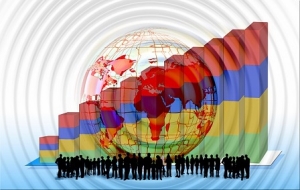 The global population is expected to expand to around nine billion within the next few decades, which poses a huge problem: How can we ensure sufficient water for the growing population?
The global population is expected to expand to around nine billion within the next few decades, which poses a huge problem: How can we ensure sufficient water for the growing population?
The world is currently struggling to supply the around 7 billion inhabitants of this planet with clean water and effective sanitation, so how are we going to be able to cope with another 2 billion?
How Can We Ensure Sufficient Water for the Growing Population?
According to the UN’s 2015 World Water Development Report, the world will face a 40% global freshwater shortfall by 2030. This would lead to food shortages, energy shortages, migration to areas where there is water, and inevitably, armed conflicts.
With the increase in population will come a projected increase of around 55% in global water demand and we need to figure out how to better manage our water resources, introduce better systems and minimise water pollution.
To this end, Katherine Purvis from the Guardian held an online Q&A with a panel of water experts, which included Carlos Hurtado Aguilar, manager Рsustainable development of water resources, FEMSA Foundation, Monterrey, Mexico; Betsy Otto, global director Рwater programme, World Resources Institute, Washington DC; Sean Furey, water and sanitation specialist, Skat, St Gallen, Switzerland; and Sophie Tr̩molet, director, Tr̩molet Consulting, London, United Kingdom.
Some of the solutions that the panel came up with were:
- Calculate the water available: We need to be able to determine how current and near-term future demand matches up with the available surface and groundwater supplies and whether local water use is sustainable or not.
- Link global water use: Government regulation or taxation should be used to make countries more aware of their water footprint and move to a more globally sustainable path.
- Treat water resources better: Measurable efforts must be made to change water-use habits on a global scale.
- Develop water monitoring and regulations: Governments should provide both regulatory sideboards and incentives to change the way water is used and to encourage water reuse and rainwater harvesting systems.
- Think across sectors: Those who work on water services and those who work on water resources need to keep the other sector in mind, e.g. the services sector should think more about where water for increased coverage is sourced from and how to best implement sanitation services that protect those water resources.
There were many more good ideas brought forth, and the discussion has opened the door to more such thinking and to an awareness between specialist from different countries as to other modes of thinking and operating, and hopefully also to more cooperation between countries to achieve all the goals to ensure that there is sufficient clean water and access to sanitation for all.
Living-Water sells water coolers in London. Try free water dispenser trial or Rent a water cooler from Living-Water.





